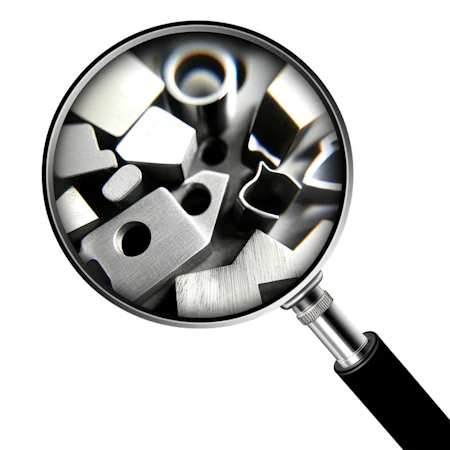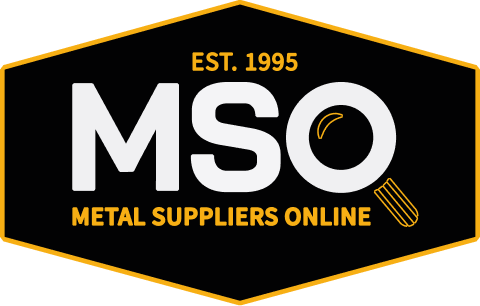Back To Browse
Titanium
Titanium 3Al-8V-6Cr-4Mo-4Zr
Annealing Procedure
Heat to 704 C (1300 F),hold for 2 hours follow by air cooling. For intermediate stress relieving, heat to 482-538 C(900-1000 F) and hold for 45 minutes.
Applications
Commonly employed in a variety of spring and fastener applications. Also found in tubulars in oil and gas wells.
Cold Workability
The cold work characteristics of this material is similar to that of a moderately tempered austenitic stainless steel. In multiple cold forming operations, intermediate stress relief is recommended to prevent tearing or other material damage. Post-work annealing is required to reattain optimum performance characteristics.
Forgeability
Rough work can be performed at 900 C (1650 F), while finishing operations should be performed at 843 C (1550 F).
Formability
May be hot or cold formed using hydropress, power brake, stretch or drop hammer methods. Similar in characteristics to 300 series stainless steels.
Hot Workability
Hot forming will reduce both the springback and required forming forces, and will increase the overall ductility of the material.
Machinability
As a family, titanium and its alloys have developed a mystique as a nightmare to machine. This is simply not the case. Experienced operators have compared its characteristics to those found in 316 stainless steel. Recommended practice includes high coolant flow(to offset the material's low thermal conductivity), slow speeds and relatively high feed rates. Tooling should be tungsten carbide designations C1-C4 or cobalt type high speed tools.
Other Physical Properties
Beta Transus (F +/- 25) 1460
Principle Design Features
This beta alloy is similar in performance to 13-11-3, but is easier to melt. It is mainly available in bar and wire forms. Beta Transus (F +/- 25) 1460
Known Forms
Bar-Hollow
Flat Bar
Forgings-Discs
Hexagon Bar
Open Die Forgings
Pipe-Seamless
Pipe-Welded
Plate
Round Bar
Sheet
Square Bar
Strip
Tube-Round (Seamless)
Tube-Round (Welded)
Wire-Flat
Wire-Round
Wire-Welding
Billet
Coil
Contour Rings
Mandrel Rings
Shafts
Shapes-Extruded
Welded Rings
Additional Data
Specifications
R58640Dismiss
Chemical Elements
| Aluminum | 3 - 4 |
| Carbon | 0.05 max |
| Chromium | 5.5 - 6.5 |
| Iron | 0.03 max |
| Molybdenum | 3.5 - 4.5 |
| Nitrogen | 0.03 max |
| Oxygen | 0.14 max |
| Titanium | Balance |
| Vanadium | 7.5 - 8.5 |
| Zirconium | 3.5 - 4.5 |
Physical Properties
Density: 0.174lb/in³
Melting Point: 3000°F
Specific Heat: 0.125BTU/lb·°F
Mechanical Properties
Modulus of Elasticity – Tension: 15MSI
Thermal Expansion
| Condition | Min | Max | Expansion Coefficient |
|---|---|---|---|
| Annealed | 32 °F | 212 °F | 4.9 µin/in/°F |
| Annealed | 32 °F | 600 °F | 5.2 µin/in/°F |
| Annealed | 32 °F | 1000 °F | 5.4 µin/in/°F |
Rupture Test Data
| Condition | Form | Temperature | Time | Rupture Strength |
|---|---|---|---|---|
| Test Specimen Annealed | Sheet | 600 °F | 100 Hours | 140 KSI |
Creep Test Data
| Condition | Form | Temperature | Time | Applied Stress | Creep Strain |
|---|---|---|---|---|---|
| Test Specimen Annealed | Sheet | 600 °F | 100 Hours | 0.2 % | 100 mil/in |
Mechanical Test Data
| Form | Sheet |
| Condition | Heat treated 1600F 1 Hr AC+ 925 F 8 Hrs |
| Measurement Temperature | 70°F |
| Elongation | 6% |
| Tensile Strength | 180KSI |
| Yield Strength | 170KSI |
| Form | Plate |
| Condition | Heat treated 1600F 1 Hr AC+ 925 F 8 Hrs |
| Measurement Temperature | 70°F |
| Elongation | 8% |
| Tensile Strength | 180KSI |
| Yield Strength | 170KSI |
| Form | Sheet |
| Condition | Solution Annealed & Aged |
| Measurement Temperature | 70°F |
| Elongation | 6% |
| Tensile Strength | 170KSI |
| Yield Strength | 160KSI |
| Form | Sheet |
| Condition | Test Specimen Annealed |
| Measurement Temperature | 70°F |
| Form | Sheet |
| Condition | Test Specimen Annealed |
| Measurement Temperature | 600°F |
| Form | Sheet |
| Condition | Test Specimen Annealed |
| Measurement Temperature | 800°F |
| Elongation | 10% |
| Tensile Strength | 145KSI |
| Yield Strength | 125KSI |
| Form | Sheet |
| Condition | Test Specimen Annealed |
| Measurement Temperature | 1000°F |
| Tensile Strength | 125KSI |
| Yield Strength | 110KSI |
Find the metal you're looking for today.

